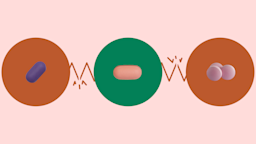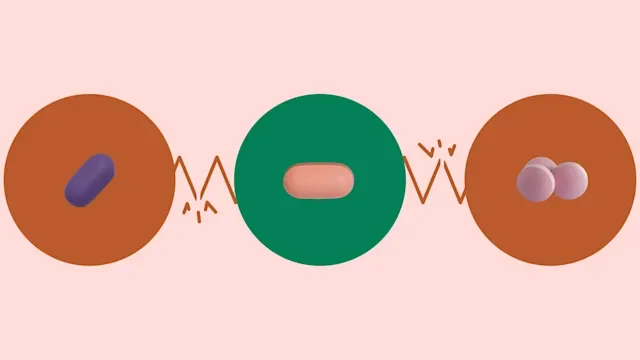Key takeaways:
Grapefruit and statins may interact. This interaction can increase your risk of statin side effects, such as muscle pain and weakness.
The grapefruit-statin interaction is only a concern with certain statins: atorvastatin (Lipitor), simvastatin (Zocor, FloLipid), and lovastatin. Other statins — including rosuvastatin (Crestor), pravastatin, and pitavastatin (Livalo, Zypitamag) — do not have this interaction.
Talk to your prescriber about whether you need to avoid grapefruit or grapefruit juice with your statin medication. In some cases, you might not need to cut out grapefruit entirely.
Save on related medications
Has a healthcare professional ever warned you to avoid eating grapefruit or drinking grapefruit juice if you’re taking a statin medication to treat high cholesterol? It might seem like a strange association, but certain statins, such as atorvastatin (Lipitor) and simvastatin (Zocor, FloLipid), can interact with grapefruit and grapefruit juice. This can raise your risk for harmful side effects.
Here’s what you need to know about grapefruit and statins.
Grapefruit and statins: How do they interact?
Your liver contains enzymes (proteins) that metabolize (break down) foods and medications so they can be eliminated from your body. But the chemicals in grapefruit can affect the enzymes that break down some statins.
In essence, grapefruit chemicals can affect how those enzymes process medications. In the case of certain statins, grapefruit chemicals stop them from being broken down. As a result, those statins remain active in the body for longer than expected.
This may cause unpleasant and even harmful side effects, such as muscle pain (myalgia). Although they’re rare, serious side effects including rhabdomyolysis are also possible. This is when muscle breaks down and releases harmful chemicals into the blood, which can lead to kidney damage. These risks are more likely to occur if you consume large amounts of grapefruit or grapefruit juice.
On the other hand, it’s possible that higher statin levels caused by a statin-grapefruit interaction may be desirable. This is because higher statin levels can boost the medication’s cholesterol-lowering effects.
How to know if you need a statin: Statins are beneficial for many people, but not everyone needs to take one. Learn if a statin may be a good option for you.
Comparing statins: There are several statin medications available. The best option for you depends on several factors, including your health history and the other medications you take.
Statin side effects: All statins can cause side effects, but they’re often mild. However, some rare side effects can be more severe.
Which statins are more likely to interact with grapefruit?
Not all statins have the same interaction with grapefruit. So, there is hope if you really enjoy grapefruit. The trouble only occurs with these statins:
Atorvastatin
Simvastatin
Depending on how much grapefruit juice or grapefruit you consume, atorvastatin, simvastatin, or lovastatin still may be OK for you to take. Your prescriber can help you decide whether grapefruit is safe based on your other health conditions, preferences, and the other medications you take.
Which statins are safe to take with grapefruit?
You can safely continue to enjoy your grapefruit with statins including:
Rosuvastatin (Crestor)
Fluvastatin (Lescol XL)
Pitavastatin (Livalo, Zypitamag)
Read more like this
Explore these related articles, suggested for readers like you.
If you love grapefruit or grapefruit juice and your prescriber recommends that you start taking a statin, one of these may be a good option for you. But some of these statins are considered to be lower-potency statins (statins that lower LDL, the “bad cholesterol,” by less than 30%). And lower-potency statins aren’t the best choice for everyone.
What are the possible side effects of mixing grapefruit and statins?
As mentioned, the risk of side effects occurs because grapefruit products can increase statin levels in the body. So the risk associated with this interaction is an increased chance of experiencing statin side effects.
There are many possible side effects of statin medications, but most of them tend to be mild. Below, we’ll cover four risks to be aware of, and what to do if they happen.
1. Muscle pain
This is the most common statin side effect. However, a large study published in 2022 found that the muscle pain people associate with their statin usually isn’t caused by the statin at all.
So, muscle pain from statins may be more rare than we think. But still, this side effect is possible. And it may be more likely with higher statin doses (or higher levels of statins in the body, which can occur when some statins are combined with grapefruit).
You may experience muscle weakness, soreness, or achiness. These symptoms can range from mild to severe, and they may be more likely if you’re older or have certain medical conditions, such as diabetes. Let your prescriber know if you experience this side effect, especially if it’s bothersome or doesn’t go away. They may recommend decreasing your statin dose or switching to another statin that’s less likely to cause muscle pain.
2. Rhabdomyolysis
This is one of the most serious statin side effects, but it is very rare. If it happens, it can cause muscle breakdown and damage to your kidneys. Some possible symptoms include severe muscle pain, dehydration, and red or brown urine. Rhabdomyolysis is more likely if you take other medications or products that increase statin levels, including grapefruit and grapefruit juice.
If you’re experiencing any of these symptoms, contact your prescriber immediately. If they believe you’re having rhabdomyolysis, you’ll likely need treatment in a hospital.
3. Changes in liver function tests
Liver function tests (LFTs) are used to see how well your liver works. They are included in some types of routine blood tests. These tests measure the levels of certain liver enzymes.
Statins can sometimes cause high liver enzymes. Rarely, this can lead to liver damage. This risk is more likely with high doses of statins. And since grapefruit products can increase statin levels, this risk may be more likely with a combination of grapefruit and statins.
Keep up with any appointments to complete blood work. If your LFTs are elevated on routine lab tests, your prescriber may make changes to your medication regimen. Additionally, watch for signs of liver damage, such as stomach pain, yellowing of the skin or eyes, and fever or chills. If you experience these symptoms, contact your prescriber immediately.
4. Higher risk of new-onset diabetes or worsening diabetes
The risk of developing diabetes from statins is small. But, your risk may increase with higher statin doses or with higher levels of statins, which can be caused by the statin and grapefruit interaction.
When it comes to whether statins can cause new-onset diabetes, research has shown that new diabetes cases typically occur only a few months earlier in those taking statins than in those who don’t take statins. This means that diabetes is likely to occur in these groups of people, whether they’re taking a statin or not. It’s possible that a statin can cause it to occur a little earlier, though.
Statins can also worsen existing diabetes. For example, some research shows that statins can increase your blood glucose (blood sugar). However, the benefit of using statins in people with diabetes outweighs the risk. In fact, statins are recommended for people with diabetes to prevent heart disease.
Is any amount of grapefruit safe to mix with statins?
It depends on what statin you’re taking, your individual health history, and the other medications you take.
For example, one glass of grapefruit juice can cause large increases in some statin levels. Drinking a glass of grapefruit juice with simvastatin or lovastatin can more than triple the levels of these statins in the blood. Even if you separate drinking the grapefruit juice from taking these statins by 12 hours, the interaction can still almost double your statin levels. With atorvastatin, levels can almost double regardless of when you consume the grapefruit.
However, as mentioned previously, other statins may not have much of an interaction with grapefruit. For example, the amount of grapefruit that’s safe to mix with rosuvastatin (a statin that isn’t known to interact with grapefruit) is different than the amount that’s safe to mix with simvastatin (a statin known to interact with grapefruit).
So, what’s the verdict? Can you drink grapefruit juice with statins?
Some experts recommend against combining grapefruit juice with statins entirely. Others recommend considering a dose reduction of the statin medication if a person wants to continue consuming grapefruit. Other options may be to consume grapefruit products in limited amounts and separate grapefruit products from your statin dose by at least 4 hours.
Other experts suggest that there’s no need to avoid moderate intake of grapefruit or grapefruit juice while taking one of these statins. This is because the medication’s heart benefits outweigh the risk of its side effects.
Any decision to drink grapefruit juice or eat grapefruit while taking a statin should be discussed with your prescriber. Both the risk of added side effects and your personal preference for grapefruit or grapefruit juice may affect your shared decision on whether you can safely continue consuming grapefruit products, as well as which statin might be best for you.
How long do you have to wait between taking statins and grapefruit?
Waiting between taking a statin medication and consuming grapefruit juice or grapefruit may prevent some of the risk of side effects. But, it’s not a common recommendation to try timing your statin medication and grapefruit so they’re spaced apart.
Atorvastatin lasts much longer than simvastatin or lovastatin. So if you are taking it, the timing of eating grapefruit or drinking grapefruit juice is not as useful. If you take simvastatin or lovastatin, there could be a benefit to spacing the medication and the grapefruit apart by several hours — at least in theory.
But, timing grapefruit consumption with medication use has not been widely studied. Always check with your prescriber about grapefruit consumption if you take atorvastatin, simvastatin, or lovastatin. They can help you decide how to best take your medication.
The bottom line
Statins and grapefruit may interact. Consuming grapefruit or grapefruit juice while taking atorvastatin (Lipitor), simvastatin (Zocor, FloLipid), or lovastatin can increase levels of these statins in your body. Other statins — such as rosuvastatin (Crestor), pravastatin, or pitavastatin (Livalo, Zypitamag) — aren’t known to interact with grapefruit.
Higher statin levels increase your risk of statin side effects. If you’re experiencing symptoms such as muscle pain or urine color changes, let your prescriber know. Most statin side effects are mild. But, some rare side effects, including rhabdomyolysis, may be severe.
Talk to your prescriber about whether you should avoid eating grapefruit or drinking grapefruit juice while taking a statin. Together, you can make a choice based on your personal preferences as well as your risks for side effects.

Why trust our experts?



References
Herrera, J. L. (2007). Medications and the liver: Overview. American College of Gastroenterology.
Hoogwerf, B. J. (2023). Statins may increase diabetes, but benefit still outweighs risk. Cleveland Clinic Journal of Medicine.
Lee, J. W., et al. (2015). Grapefruit juice and statins. The American Journal of Medicine.
Kellick, K. A., et al. (2014). A clinician's guide to statin drug-drug interactions. Journal of Clinical Lipidology.
Lilja, J. J., et al. (1999). Grapefruit juice increases serum concentrations of atorvastatin and has no effect on pravastatin. Clinical Pharmacology & Therapeutics.
Lilja, J. J., et al. (2004). Effects of regular consumption of grapefruit juice on the pharmacokinetics of simvastatin. British Journal of Clinical Pharmacology.
Mendes, P., et al. (2014). Statin-induced rhabdomyolysis: A comprehensive review of case reports. Physiotherapy Canada.
















